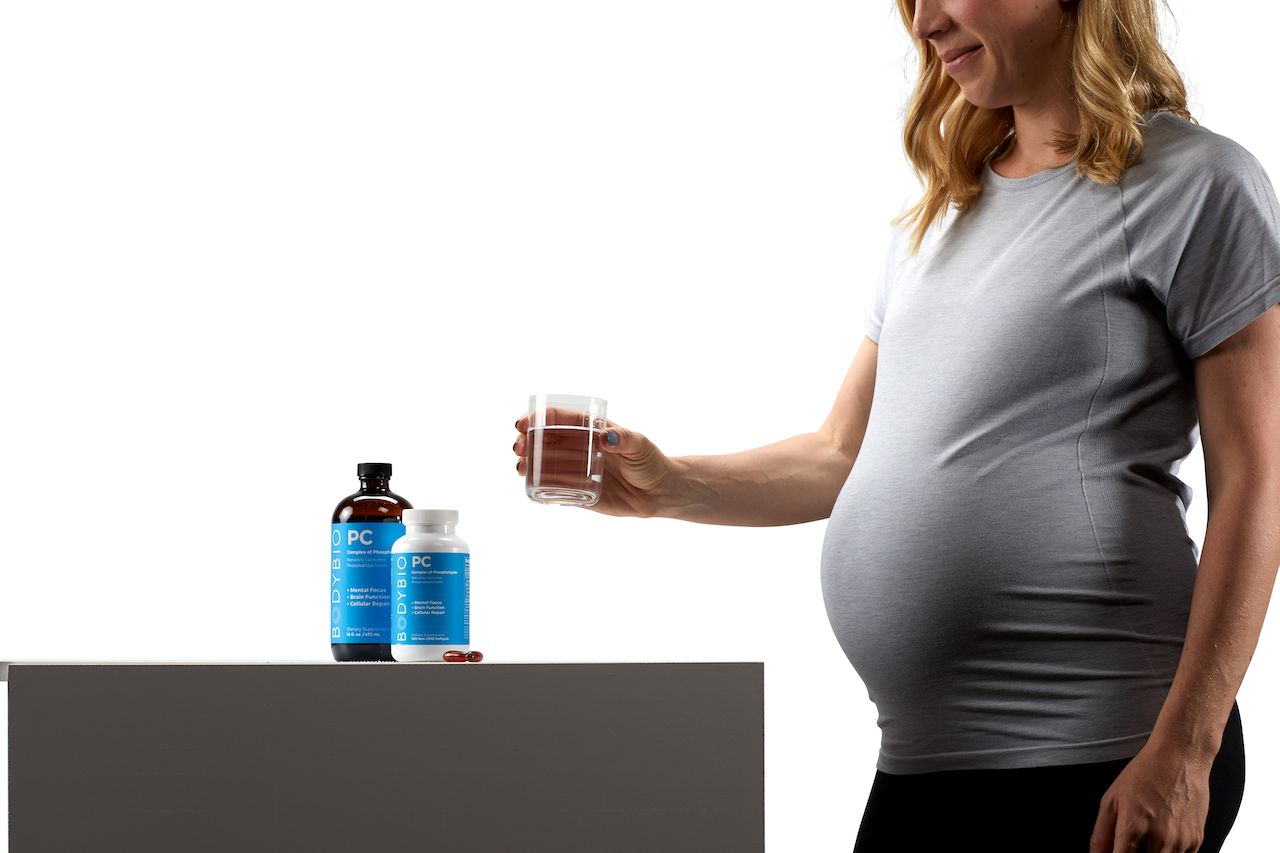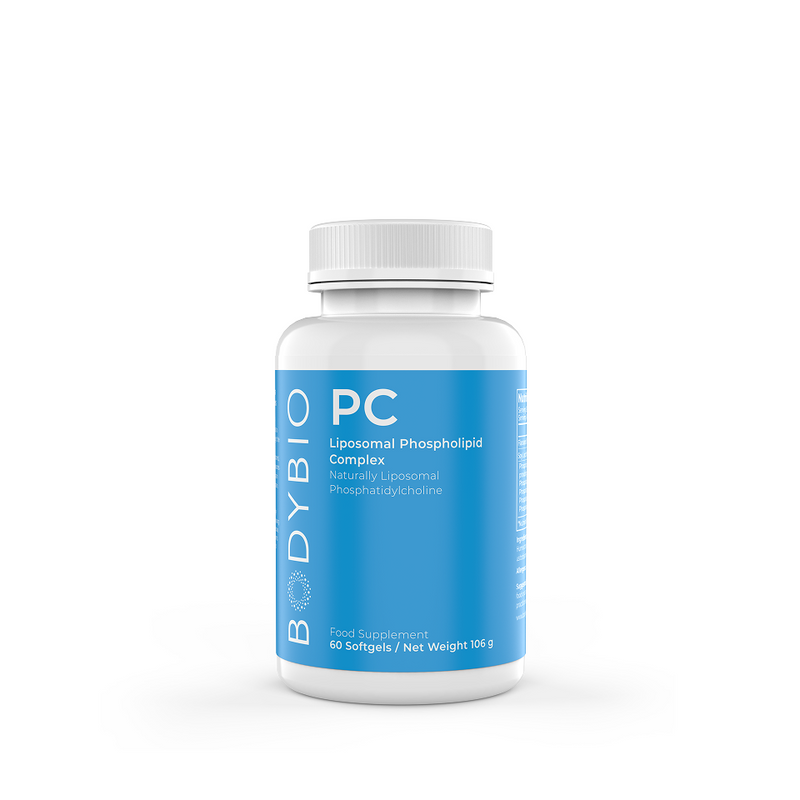How to Have Healthy Babies Using Phosphatidylcholine During Pregnancy
Most women and even doctors underestimate just how dramatically pregnancy changes your body over the course of nine months. The advice doctors have been giving for decades—take your prenatal vitamins, rest, do gentle exercise, and so on—often doesn’t cut it for many women who still find themselves exhausted, moody, and dealing with extra symptoms such as heartburn and nausea that are seen simply as part of the pregnancy experience.
But these issues are actually signals that the body isn’t getting enough of the massive amount of nutrients it needs to create a new life. Most women aren’t fueling themselves and baby enough of the right foods in the right amounts to sustain a happy, healthy pregnancy for both mom and baby. There is a huge lack of education in this area from providers.

One of these key nutrients is phosphatidylcholine (PC), which includes the critical nutrient choline for brain, gut, and neurotransmitter health, as well as phospholipids, the building blocks of our cell membranes.*
Phosphatidylcholine is a major component of the biological membranes that support healthy development of the baby’s lungs and lung surfactants as well as overall healthy fetal growth—especially during the third trimester.*
That's when the fetus creates an increased demand for PC, which is transferred from the mother to her developing infant through her nutrient intake of food and supplementation. It’s not enough to just take any choline-containing prenatal vitamin and ignore the important diet component.
Here’s how PC and choline can support both mother and baby during pregnancy.
How Does Choline Support a Healthy Pregnancy?
Choline is a vitamin-like essential nutrient that plays a key part in several metabolic functions. Choline is an important factor in brain development when you're in the womb, and it influences cognitive function later in life. When you're choline deficient, it can cause muscle damage and abnormal fat deposits in the liver, which can result in non-alcoholic fatty liver disease. Your body can't synthesize all the choline it needs, which is why making it a part of your diet is essential.
When a growing baby is deficient in choline, it can cause inadequate brain, spine, or spinal cord development, and even if the baby escapes these serious consequences, they can still have lowered memory capacity and slower cognition as they develop.[1]*
Increasing your dietary choline intake with foods like liver, egg yolk, organic edamame beans and sunflower seeds as a mom-to-be supports healthy fetal neural development for the baby, and maintains good liver and placenta function for you.[2]*
Why Should You Add Phosphatidylcholine to Your Pregnancy Care Plan?
Truly liposomal PC is not intended to supply choline—we recommend getting that from your diet. But adding phospholipids into your pregnancy routine has significant benefits that we will explore below.
Phospholipids are the fatty acid molecules that form our cellular structure—our cell membranes and the microscopic organelles within them that ensure that all of the many processes that run our bodies operate smoothly. Phosphatidylcholine is the most abundant of these phospholipids our body needs. Our cells are able to use phosphatidylcholine as essential building blocks for maintaining and rebuilding our cells.* This is excellent news for pregnant women, as they are essentially building a new human being one cell at a time!
PC supports healthy lung development*
Research shows that lungs develop closer to your baby’s delivery, including the baby’s lung surfactants. These lipid-protein complexes stabilize the structure of the lung, but errors in this system can cause severe respiratory pathologies. The good news is that these issues may be assuaged or completely prevented by a surfactant material such as exogenous PC, as it facilitates healthy development of the lungs and lung surfactants, as well as overall healthy fetal growth.*
PC supports healthy synapse formation and cognitive brain development*
As we shared above, the fetus increases its demand for PC during the third trimester. Women who supplemented with high-quality fish oil showed higher levels of DHA in their blood, while interventional assessment of their child showed the same. DHA values are associated with increased brain levels of PC and related membrane phosphatides by as much as 50%, which lays the groundwork for synapse formation and cognitive brain development.*
PC promotes healthy birth weight*
We often look to birth weight as a sign of an infant’s health, and research has shown that PC has the capacity to support the baby’s healthy birth weight. The state of both a mother’s metabolism, and that of her unborn child, can have a big impact on fetal growth and birth outcomes. For example, low birth weight has been associated with increased susceptibility to hypertension later in life. Both omega-3 DHA and omega-6 linoleic acid (from sources such as Evening Primrose Oil, BodyBio Balance Oil, or Safflower Oil) is positively associated with birth weight, body mass index, adipose tissue volume and postnatal length and height.*
How Much Phosphatidylcholine/Phospholipids Will Support Your Optimal Pregnancy?
As with any kind of supplementation, it’s important to work with a healthcare professional to ensure you’re getting what you need, when you need it. Currently, there’s no studies that share an optimal dosage related to specific situations such as pregnancy, but from what we know of the developmental stages in pregnancy, your need for PC will increase with the growth of your infant.
At BodyBio, we recommend starting out with two of our PC softgels with food and seeing how your body responds, then working your way up to four softgels or one teaspoon to maximize your benefits.
How to Get Enough Phosphatidylcholine and Phospholipids During Pregnancy
PC can be obtained through your diet. The best dietary sources of PC are animal-based, including:
- Eggs
- Liver
- Fish
- Beef
- Chicken
- Pork
- Raw Milk
- Butter
Animal foods provide saturated are easier for the body to digest and absorb nutrients and usually contain more of them per serving than plant foods. A great place to start is making sure you’re eating two eggs per day, especially the yolks.
Additional, but less optimal sources include:
- Potatoes
- Broccoli
- Wheat germ
- Sunflower seeds/sunflower seed butter
- Peanuts/peanut butter.
Potatoes you’ll want to include as a great healthy satiating carb source, but the rest of these foods you should limit to once or twice per week. Yep, even the broccoli! Most of us can’t digest cruciferous veggies well, so you’re better off having an extra egg or a little more steak than consuming more broccoli in terms of increasing your choline intake. Pay attention to how you feel after you eat these foods, and you’ll know what works best for your body.
Prioritize animal foods, animal protein, especially liver, eggs, and red meat, healthy fats like grass-fed butter, avocado and coconut oil, satiating carbs like roots and fruits for energy, and yes, even simple sugars like maple syrup and honey. These are the foods that you and baby need for sustainable energy and development!
Phosphatidylcholine Supplements for Pregnancy
Supplementation is the next best way to ensure you’re getting all the PC and all the great phospholipids you need to support your baby’s growth, and with BodyBio PC, you get three forms of pure phospholipids for quick absorption to help rebuild your cells and provide liver and brain support for both you and baby.
Additional forms of just choline include choline bitartrate, lecithin, and alpha-GPC, which will also provide choline but not the additional phospholipids needed for growing cells. Again, we recommend getting choline from food sources.
Pregnancy Nutrition Advice You May Not Be Getting From Your Provider
Choline and phospholipids are just two of the many nutrients you need before, during, and after pregnancy to ensure a healthy and fully developed baby. Other key nutrients include abundant amounts of the fat-soluble vitamins, vitamins A, D, E and K, as well as folate, magnesium, calcium, and more. To get these nutrients in your diet, you should focus on foods with high nutrient content, such as animal foods and plant foods from well-mineralized organic soil as much as possible.
Unfortunately, most women are not getting critical nutrition advice when relying on their OB or provider. It’s ultimately your responsibility to question the advice you’re getting, follow your intuition with what feels right for your body, and seek out the nutrition knowledge you need when preparing for pregnancy, eating during pregnancy, and continuing on post-pregnancy/while breastfeeding. Do the best you can with the resources you have, and think positively that you are supporting yourself and baby with better nutrition knowledge.
As a place to get started, we love referring women trying to conceive and pregnant women to the Weston A. Price Foundation website as a great resource for whole-food nutrition before, during, and after pregnancy.
And of course, if you have any questions about our Bodybio PC or any of our other supplements that can support a healthy pregnancy, don’t hesitate to reach out!https://faseb.onlinelibrary.wiley.com/doi/full/10.1096/fj.12-221648
https://www.babycenter.com/pregnancy/diet-and-fitness/choline-in-your-pregnancy-diet_10325647
https://www.westonaprice.org/podcast/how-to-have-a-healthy-pregnancy/
https://www.westonaprice.org/health-topics/faq-diet-in-pregnancy/
https://pubmed.ncbi.nlm.nih.gov/15640516/
*These statements have not been evaluated by the Food and Drug Administration. These products are not intended to diagnose, treat, cure, or prevent any disease.






